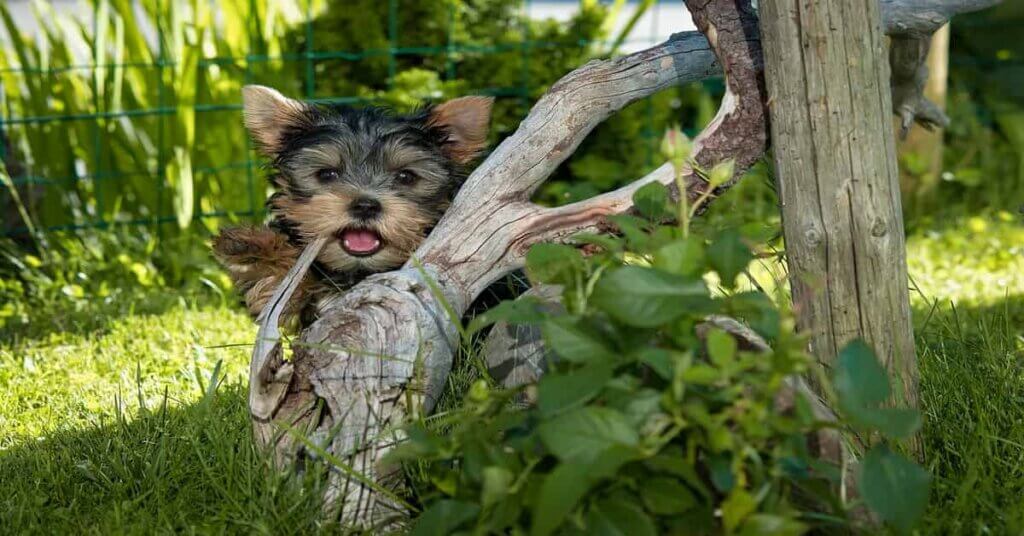Dive into the delightful world of the Yorkie, a breed that packs an enormous personality into a tiny package. The Yorkshire Terrier, affectionately known as the Yorkie, is not just a toy dog breed; it’s a bundle of energy, intelligence, and affection. In this comprehensive guide, we’ll explore the “Yorkie grooming essentials,” dive into the “Best diet for Yorkies,” and reveal effective “Socialization techniques for Yorkies.” Understanding their unique “Yorkie health care guide” is key to keeping them happy and healthy.
Whether you’re following the “Yorkie adoption process” or learning about “Yorkie puppy development,” this guide is designed to help you navigate the joys and challenges of living with a Yorkie. Prepare to be charmed by their “Yorkie temperament traits” and learn how to integrate these spirited companions into your family seamlessly, reflecting on “Yorkie compatibility with families.”
Table of Contents
Yorkie Dog breed
Yorkshire Terriers, generally referred to as Yorkies, are a toy dog breed that originated in Yorkshire, England. These canines are part of the Terrier family and are one of the tiniest and most well-known types of dogs.
With their high adaptability, bravery, effervescent attitude, graceful appearance, and intellect, these tiny but lovable pups have won over millions of hearts as companions and lapdogs. They are predicted to reach a maximum height of 8 to 9 inches and a maximum weight of 4 to 7 pounds, with a lifespan of 13 to 16 years.
History of Yorkshire Terrier Dogs
The Yorkshire Terrier breed dates back to the mid-1800s. Originating from the northern English counties of Yorkshire and Lancashire, in late Victorian times, they emerged as a trendy lapdog for aristocratic English ladies, but the breed’s origins are rooted in working-class society.

The Yorkie is thought to have been created by Scottish weavers who moved to the English north country along with their Scottish terriers. The Yorkie’s genetic background includes numerous varieties of presently-extinct Scottish terriers.
Many Yorkies worked as exterminators in coal mines in their native areas, which was also a mining and textile manufacturing hub.
The English Kennel Club officially recognized the Yorkie as a dog breed in 1886, marking a watershed moment in the breed’s history. The Yorkie gained popularity as a ladies’ companion
as a result of this exposure. And have become mainstays in high society ever since. The first Yorkie was seen on the other side of the pond in the 1870’s and was granted breed recognition by the American Kennel Club in 1885.
Yorkshire Terrier Dog Information
A hallmark of this breed is its silky and glossy coats. The following Yorkshire Terrier information and standards have been specified by the American Kennel Club (AKC).

Yorkies are small, toy-sized dogs. These tiny, compact, and well-proportioned creatures rarely weigh more than seven pounds but pack a hefty punch with their feisty and energetic personality.
Size:
Yorkies should be small, neat, and well-proportioned in size. Yorkies have short backs, and the shoulder and rump are on the same height level. This breed should have straight fore and hindlegs without protruding elbows.
Head Shape:
Yorkshire Terriers have their head carriages held up high, giving them a look of sophistication and self-importance. The heads of Yorkies are small, and their skulls shouldn’t be too noticeable and round. They should have a moderately sized muzzle without an over or underbite. They should have a black nose and medium-sized dark-colored eyes. Finally, the ears should be small, “V-shaped,” and be set proportionally apart from each other.
Coat and Color:
The coat fur should be glossy, smooth, and fine texturally. The coat fur should be perfectly straight and moderately long lengthwise. Furthermore, the muzzle hair should be long in length.
Most Yorkies come in a combination of black, gold, tan and blue fur. However, the standard mix of colors are black & tan, blue & gold, blue & tan, and finally black & gold. The head, chest and leg fur of the dog should always be a tan color, while the other parts, mainly the coat varies in color.
Tail Shape:
Yorkshire Terriers’ tails should be of a medium length and be placed marginally above their backs.
Yorkshire Terrier Characteristics and traits

Every dog breed has characteristics and traits exclusive to themselves, making them unique and stand out. These characteristics are social, physical, and behavioral traits displayed by dogs of the breed.
Social traits:
Yorkies’ social character is defined by how they interact with their owners, family, and other people. These canines are laid-back and friendly. Yorkshire Terriers have a friendly disposition, are lively and protective of their family members, and are open to new people, places, and experiences.
Temperament:
Yorkies are cool-tempered dogs. Even though they aren’t as submissive as other breeds, they can be described as kind and pleasant-natured, especially in regards to humans. This makes them suitable for being pets to families with younger children.
Playfulness:
Yorkshire Terriers are playful dogs. After all, they are still Terriers despite their small sizes. These pups will always be down to play with their owners.
Protectiveness:
Yorkies are very vigilant dogs and so, passers-by, water sprinklers, and tiny animals are all potential risks and triggers for these dogs. They are exceptionally protective of small children because they can sense their innocence and naivety.
Adaptability:
This breed is highly adaptive to new situations. They can easily cope with changes in day-to-day life, the weather, living conditions, and so on. As a result, these canines can adjust to both the peacefulness of the countryside and the frantic pace of city life.
Openness:
Yorkshire Terriers are affectionate dogs. They are not shy or unfriendly to strangers, unlike many other breeds. Yorkies adore humans and will always seek out their pets and attention. They’ll eagerly interact with and befriend other people.
Yorkshire Terrier Physical Characteristics
Some of the hallmark features that differentiate Yorkshire Terriers from other dog breeds are listed down below.
Shedding:
Yorkies have silky and long coats and with proper care, tend to shed minimally. Due to this, Yorkies are a dog popular amongst busy and large families with young children.
Drooling:
Fortunately, Yorkie dogs have a low drooling level and are very unlikely to drool.
Coat Grooming:
Yorkie fur is very similar in structure to human hair and thus requires identical levels of upkeep and care. Yorkies should be brushed daily and bathed with shampoo once a week at the bare minimum to avoid an unhealthy coat.
Yorkshire Terrier Personality Characteristics
Yorkshire Terriers are an intelligent dog breed, which is deeply reflected in their personality and traits. They are also quite energetic, noisy, and require a lot of mental stimulation to stay well.
Trainability:
Yorkies are easy to train due to their friendly and eager-to-please nature. However, they are not
very submissive in nature and do not respond well to harsher training methods, which can sometimes get in the way of training.
Energy:
Yorkshire Terriers are known for their high energy levels and eagerness to try new things. Even though other breeds eclipse them in terms of energy, Yorkies should, at the very least, get some exercise every day through walks, playing fetch, and tug-of-war. They may engage in destructive behavior if they do not get enough exercise.
Mental Simulation:
Yorkies are ranked 17th out of 90 in terms of intelligence. So, as you might expect, lively and bright dogs like Yorkies need substantial mental simulation. In addition, a lack of mentally stimulating activity may lead to destructive and clingy behavior.
Barking:
Yorkies make a lot of noise, barking and howling to express their vibrant personalities. They do, however, bark more when they are upset due to a lack of appropriate physical and social activity. Due to their watchdog nature, Yorkies are likely to bark at perceived threats and triggers.
Family Life:
Yorkshire Terriers are very friendly as a breed. Their endearment towards their family and children explain why they are so consistently popular as a pet.
Yorkie Dog breed Behavior
Yorkies, as previously mentioned, are friendly and kind dogs. They flourish when they are surrounded by family and friends. Terriers are ideal family dogs because of their people-oriented personality and the instinctive need to be social, and Yorkies are no exception. They have an overwhelming amount of affection for their loved ones, making them a delight to be around.
Behavior with young children:
Yorkies are patient and submissive by nature. As a result, they are an excellent option for families with young children. They are well-suited to living with young children because of their upbeat nature, playful temperament, and boundless energy. Yorkshire Terriers can detect that babies and children cannot protect themselves and become more cautious and gentle around them. Parents should, however, take the time to properly introduce their children and dogs, as well as monitor playtimes, since unintended scrapes and bruises may occur at any time with dogs.
Behavior with other dogs:
Unfortunately, the friendly nature of Yorkshire Terriers isn’t reflected in their behavior with other dogs. While they are adaptable to other dogs, they aren’t as friendly as other breeds such as Labradors or Retrievers. Even though proper training and instructions can mitigate issues your Yorkie may have with another pup, it is advised to supervise your Yorkie’s interactions with other dogs.
Caring for Yorkshire Terrier Dogs
Owning a pet requires extensive work, and Yorkshire Terriers are no exception. Caring for a pet requires patience and understanding as pets rely on their humans for food, shelter, and other essentials.

At the end of the day, the satisfaction of raising such a lovable and loyal Yorkie outweighs all of the hard work involved.
Health and Diseases:
Yorkshire Terriers are an overall healthy breed. Most responsible breeders will screen out their breeding stock for health conditions such as eye irregularities. However, Yorkies are prone to suffer from luxating patella, which is a dislocated kneecap.
This condition can be avoided by limiting the heights that Yorkies jump, especially in puppyhood. Nonetheless, the National Breed Club recommends getting a patella and ophthalmologist evaluation for this breed.
Exercise for Yorkshire Terrier

Even though Yorkies are small dogs, just like their larger counterparts, they require exercise to stay fit and healthy.
As a member of the Terrier family, these pint-sized dogs can be pretty energetic.
Therefore, Yorkies will benefit from moderate exercises, such as slow walks with their owners and brief bursts of movement and chasing after tennis balls in the backyard. A short stroll around the neighborhood twice a day would most likely be plenty for your Yorkie to use up their energy. Participating in dog sports can offer them excellent exercise.
Nutrition tips for Yorkshire Terrier Dog
High-quality dog food is recommended for Yorkshire Terriers. The diet fed should be tailored to the dog’s age, as terriers have different nutritional requirements at different life stages. Yorkies can be fed commercial dog food and homemade meals. However, they should be fed in
moderation as this breed is prone to obesity. Furthermore, all food prepared should be approved beforehand by your veterinarian to avoid feeding your dog any allergens or stomach triggers.
Training for Yorkshire Terrier Dog
As stated previously, Yorkies are loyal to their owners, intelligent, and are eager to please. Instead of harsh reprimanding, positive reinforcement through lavish praise and treats for good and obedient behavior will work wonders with Yorkie Terriers.
It is recommended that Yorkies be socialized to unfamiliar circumstances, people, and other dogs from an early age.
Furthermore, they should be gradually introduced to new settings, in a peaceful and joyful environment. Although a toy dog breed, Yorkies may participate in and excel at canine sports such as rally, agility, and obedience. Additionally, many Yorkies can be trained to work with their human companions in professions such as therapy.
Grooming for Yorkshire Terrier Dog
Yorkshire Terriers have hypoallergenic coats that are very similar to human hair. Thus, they require more upkeep than other toy breeds. It is recommended to groom and brush Yorkies daily and bathe them with pet shampoo to ensure they stay clean and well.
The hair on the upper part of their face should either be trimmed or pulled up into a knot to avoid it coming into contact with their eyes and resulting in eye irritation.

They are predicted to reach a maximum height of 8 to 9 inches and a maximum weight of 4 to 7 pounds, with a lifespan of 13 to 16 years.
Yorkshire Terriers, generally referred to as Yorkies, are a toy dog breed that originated in Yorkshire, England. These canines are part of the Terrier family and are one of the tiniest and most well-known types of dogs.
With their high adaptability, bravery, effervescent attitude, graceful appearance, and intellect, these tiny but lovable pups have won over millions of hearts as companions and lapdogs.
Yorkie Dog Breed Adoption Process
Adopting a Yorkie is a journey filled with excitement and responsibility. The “Yorkie adoption process” involves more than choosing a cute puppy; it requires understanding the “Yorkie breed characteristics” and their specific needs. When considering adoption, it’s important to research and prepare using resources like “Yorkie health care guides.” Prospective owners should inquire about “Yorkie puppy development” stages and any “Yorkie health issues” to ensure they can provide the necessary care.
As part of the process, consider the “Yorkie temperament traits” and whether they align with your lifestyle. “Yorkie compatibility with families” is crucial, especially in households with young children or other pets. Ensure that the adoption source, whether a breeder or rescue, follows ethical practices and provides comprehensive “Training tips for Yorkies.” An informed decision during the adoption process sets the foundation for a fulfilling life with your Yorkie, ensuring that both you and your new furry friend are well-prepared for this exciting journey together.
Yorkie Dog Breed Food and Diet
The diet of a Yorkie plays a pivotal role in their overall health and well-being. “Best diet for Yorkies” should include high-quality, nutritionally balanced dog food that caters to their small size and high energy levels. When considering “Yorkie food and diet,” focus on foods that promote healthy digestion and support their “Yorkie activity levels.” It’s also crucial to be aware of any “Yorkie health issues” that can be influenced by diet, such as dental problems or food sensitivities.
Smaller breeds like Yorkies often have specific dietary requirements, and consulting a “Yorkie health care guide” can provide valuable insights. Additionally, “Yorkie grooming essentials” such as maintaining a healthy coat are directly influenced by their nutrition. Incorporating a variety of foods, while ensuring they receive all the necessary vitamins and minerals, is key. Remember, overfeeding can lead to obesity, so adhering to recommended “Exercise routines for Yorkies” alongside a balanced diet is essential for maintaining their ideal weight and health.
Yorkie Dog Breed Socialization Techniques
Socialization is critical in shaping a well-behaved and confident Yorkie. Effective “Socialization techniques for Yorkies” involve gradually exposing them to a variety of people, environments, and situations. This process helps develop their “Yorkie temperament traits” positively and reduces anxiety or fear in new situations. It’s an integral part of “Training tips for Yorkies,” enabling them to become well-adjusted pets.
Introducing your Yorkie to different experiences from a young age, as per “Yorkie puppy development” guidelines, ensures they grow up to be sociable and adaptable. This includes meeting other dogs, which aids in their “Yorkie social needs,” and familiarizing them with various sounds and environments. Remember, each Yorkie is unique, and “Understanding Yorkie behavior” during socialization helps tailor experiences to their personality, ensuring they feel safe and comfortable.
Yorkie Dog Breed Size and Lifespan
The size and lifespan of a Yorkie are key factors in understanding how to care for them properly. Yorkies are a toy breed, typically weighing between 4 to 7 pounds, as outlined in “Yorkie breed characteristics.” Their small size demands careful handling and an environment that ensures their safety. The typical “Yorkie size and lifespan” include a life expectancy of around 11 to 15 years, with proper care and a healthy lifestyle.
During their lifespan, it’s important to consider “Yorkie health issues” that may arise and how their size affects their physical capabilities. Adhering to “Exercise routines for Yorkies” suitable for their small stature is crucial. Additionally, their size influences their dietary needs, as highlighted in the “Best diet for Yorkies,” requiring nutrient-rich food in small, manageable portions.
Yorkie Dog Breed Safety Tips
Ensuring the safety of your Yorkie is paramount, given their small size and curious nature. “Yorkie Dog Breed safety tips” include creating a safe living environment, free from hazards that could harm such a small dog. This involves securing spaces where they can play and rest safely, keeping harmful substances out of reach, and using appropriate harnesses and leashes during walks.
When outdoors, be mindful of their interactions with larger animals, as their small size can make them vulnerable. Understanding “Yorkie behavior” helps in recognizing situations where they might feel threatened or scared. Regular visits to the vet for “Yorkie health care” checks and adhering to recommended “Training tips for Yorkies” also play a crucial role in ensuring their safety and well-being.
Conclusion
In conclusion, owning a Yorkie is a delightful and rewarding experience, but it comes with the responsibility of understanding and catering to their unique needs. From navigating the “Yorkie adoption process” to providing the “Best diet for Yorkies,” every aspect of their care is crucial for their health and happiness. Implementing proper “Socialization techniques for Yorkies” and understanding their “Size and lifespan” are key to ensuring a fulfilling life for your furry companion. With the right care, attention, and love, your Yorkie will not only thrive but also bring endless joy and companionship to your life.





Pingback: The Best Dog Food for Yorkie - Barkingcanine.com